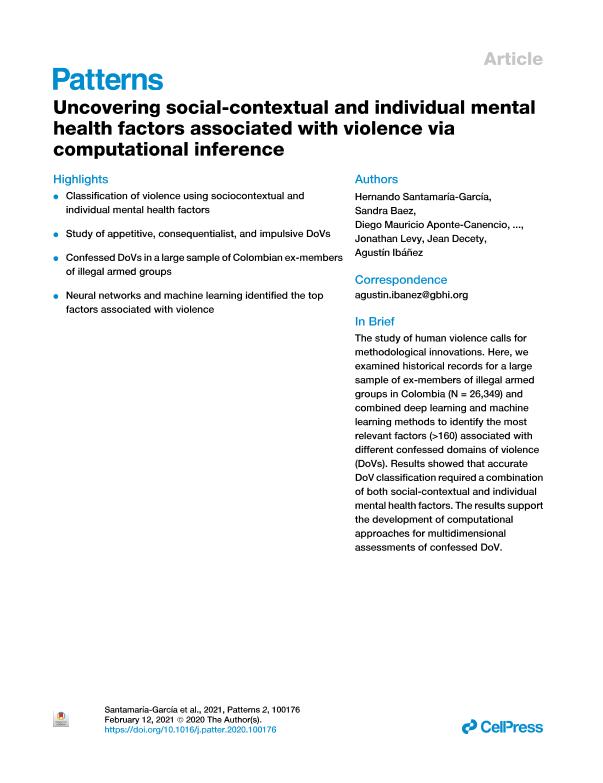Mostrar el registro sencillo del ítem
dc.contributor.author
Santamaría García, Hernando
dc.contributor.author
Báez Buitrago, Sandra Jimena

dc.contributor.author
Aponte Canencio, Diego Mauricio
dc.contributor.author
Pasciarello, Guido Orlando
dc.contributor.author
Donnelly Kehoe, Patricio Andres

dc.contributor.author
Maggiotti, Gabriel
dc.contributor.author
Matallana, Diana
dc.contributor.author
Hesse Rizzi, Eugenia Fátima

dc.contributor.author
Neely, Alejandra
dc.contributor.author
Zapata, José Gabriel
dc.contributor.author
Chiong, Winston
dc.contributor.author
Levy, Jonathan
dc.contributor.author
Decety, Jean
dc.contributor.author
Ibáñez, Santiago Agustín

dc.date.available
2022-08-11T14:22:45Z
dc.date.issued
2021-02-12
dc.identifier.citation
Santamaría García, Hernando; Báez Buitrago, Sandra Jimena; Aponte Canencio, Diego Mauricio; Pasciarello, Guido Orlando; Donnelly Kehoe, Patricio Andres; et al.; Uncovering social-contextual and individual mental health factors associated with violence via computational inference; Cell Press; Patterns; 2; 2; 12-2-2021; 1-21
dc.identifier.issn
2666-3899
dc.identifier.uri
http://hdl.handle.net/11336/165171
dc.description.abstract
The identification of human violence determinants has sparked multiple questions from different academic fields. Innovative methodological assessments of the weight and interaction of multiple determinants are still required. Here, we examine multiple features potentially associated with confessed acts of violence in ex-members of illegal armed groups in Colombia (N = 26,349) through deep learning and feature-derived machine learning. We assessed 162 social-contextual and individual mental health potential predictors of historical data regarding consequentialist, appetitive, retaliative, and reactive domains of violence. Deep learning yields high accuracy using the full set of determinants. Progressive feature elimination revealed that contextual factors were more important than individual factors. Combined social network adversities, membership identification, and normalization of violence were among the more accurate social-contextual factors. To a lesser extent the best individual factors were personality traits (borderline, paranoid, and antisocial) and psychiatric symptoms. The results provide a population-based computational classification regarding historical assessments of violence in vulnerable populations. We assessed a comprehensive group of social-contextual and individual mental health factors to classify confessed acts of violence committed in the past among a large sample of Colombian ex-members of illegal armed groups (N = 26,349). We used a novel data-driven approach to classify subjects based on four confessed domains of violence (DoVs) and including two groups, (1) ex-members who admitted violent acts and (2) ex-members who denied violence in each DoV, matched by sex, age, and education stage. We found that accurate classification required both social-contextual and individual mental health factors, although the social-contextual factors were the most relevant. Our study provides population-based evidence on the factors associated with historical assessments of violence and describes a powerful analytical approach. This study opens up a new agenda for developing computational approaches for situated, multidimensional, and evidence-based assessments of violence. The study of human violence calls for methodological innovations. Here, we examined historical records for a large sample of ex-members of illegal armed groups in Colombia (N = 26,349) and combined deep learning and machine learning methods to identify the most relevant factors (>160) associated with different confessed domains of violence (DoVs). Results showed that accurate DoV classification required a combination of both social-contextual and individual mental health factors. The results support the development of computational approaches for multidimensional assessments of confessed DoV.
dc.format
application/pdf
dc.language.iso
eng
dc.publisher
Cell Press

dc.rights
info:eu-repo/semantics/openAccess
dc.rights.uri
https://creativecommons.org/licenses/by-nc-nd/2.5/ar/
dc.subject
DEEP NEURAL NETWORKS
dc.subject
DSML 5: MAINSTREAM: DATA SCIENCE OUTPUT IS WELL UNDERSTOOD AND (NEARLY) UNIVERSALLY ADOPTED
dc.subject
EX-MEMBERS OF ILLEGAL ARMED GROUPS
dc.subject
MACHINE LEARNING METHODS
dc.subject
MENTAL DISORDERS
dc.subject
MENTAL HEALTH
dc.subject
PERSONALITY TRAITS
dc.subject
SOCIAL ADVERSITY
dc.subject
SOCIAL RESOURCES
dc.subject
VIOLENCE
dc.subject.classification
Ciencias de la Computación

dc.subject.classification
Ciencias de la Computación e Información

dc.subject.classification
CIENCIAS NATURALES Y EXACTAS

dc.title
Uncovering social-contextual and individual mental health factors associated with violence via computational inference
dc.type
info:eu-repo/semantics/article
dc.type
info:ar-repo/semantics/artículo
dc.type
info:eu-repo/semantics/publishedVersion
dc.date.updated
2022-08-09T17:31:33Z
dc.journal.volume
2
dc.journal.number
2
dc.journal.pagination
1-21
dc.journal.pais
Estados Unidos

dc.journal.ciudad
Nueva York
dc.description.fil
Fil: Santamaría García, Hernando. Pontificia Universidad Javeriana; Colombia. Hospital Universitario San Ignacio; Colombia
dc.description.fil
Fil: Báez Buitrago, Sandra Jimena. Universidad de los Andes; Colombia. Consejo Nacional de Investigaciones Científicas y Técnicas; Argentina
dc.description.fil
Fil: Aponte Canencio, Diego Mauricio. Universidad Externado de Colombia.; Colombia. Agencia para la Reincorporación y la Normalización; Colombia. Aalto University; Finlandia
dc.description.fil
Fil: Pasciarello, Guido Orlando. Ineco Neurociencias Oroño; Argentina. Consejo Nacional de Investigaciones Científicas y Técnicas. Centro Científico Tecnológico Conicet - Rosario. Centro Internacional Franco Argentino de Ciencias de la Información y de Sistemas. Universidad Nacional de Rosario. Centro Internacional Franco Argentino de Ciencias de la Información y de Sistemas; Argentina
dc.description.fil
Fil: Donnelly Kehoe, Patricio Andres. Ineco Neurociencias Oroño; Argentina. Consejo Nacional de Investigaciones Científicas y Técnicas. Centro Científico Tecnológico Conicet - Rosario. Centro Internacional Franco Argentino de Ciencias de la Información y de Sistemas. Universidad Nacional de Rosario. Centro Internacional Franco Argentino de Ciencias de la Información y de Sistemas; Argentina
dc.description.fil
Fil: Maggiotti, Gabriel. Asapp; Argentina
dc.description.fil
Fil: Matallana, Diana. Pontificia Universidad Javeriana; Colombia
dc.description.fil
Fil: Hesse Rizzi, Eugenia Fátima. Universidad de San Andrés; Argentina. Consejo Nacional de Investigaciones Científicas y Técnicas; Argentina
dc.description.fil
Fil: Neely, Alejandra. Universidad Adolfo Ibañez; Chile
dc.description.fil
Fil: Zapata, José Gabriel. Universidad Externado de Colombia.; Colombia
dc.description.fil
Fil: Chiong, Winston. University of California San Francisco - Weill Institute for Neurosciences; Estados Unidos
dc.description.fil
Fil: Levy, Jonathan. Aalto University; Finlandia. Interdisciplinary Center Herzliya; Israel
dc.description.fil
Fil: Decety, Jean. University of Chicago; Estados Unidos
dc.description.fil
Fil: Ibáñez, Santiago Agustín. Universidad de San Andrés; Argentina. Universidad Adolfo Ibañez; Chile. Universidad Autónoma del Caribe; Colombia. Consejo Nacional de Investigaciones Científicas y Técnicas; Argentina
dc.journal.title
Patterns
dc.relation.alternativeid
info:eu-repo/semantics/altIdentifier/url/https://www.sciencedirect.com/science/article/pii/S2666389920302403
dc.relation.alternativeid
info:eu-repo/semantics/altIdentifier/doi/https://doi.org/10.1016/j.patter.2020.100176
Archivos asociados
